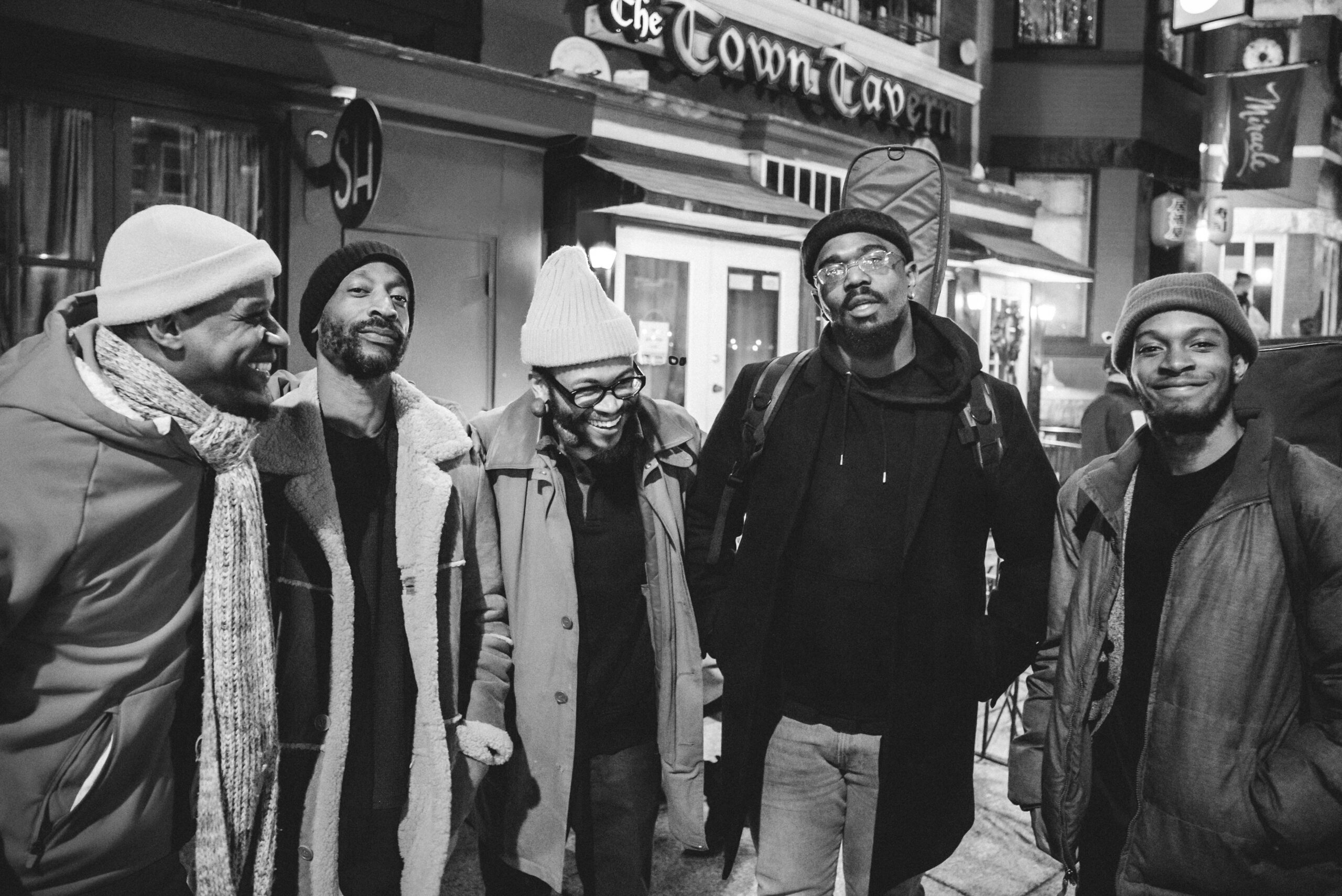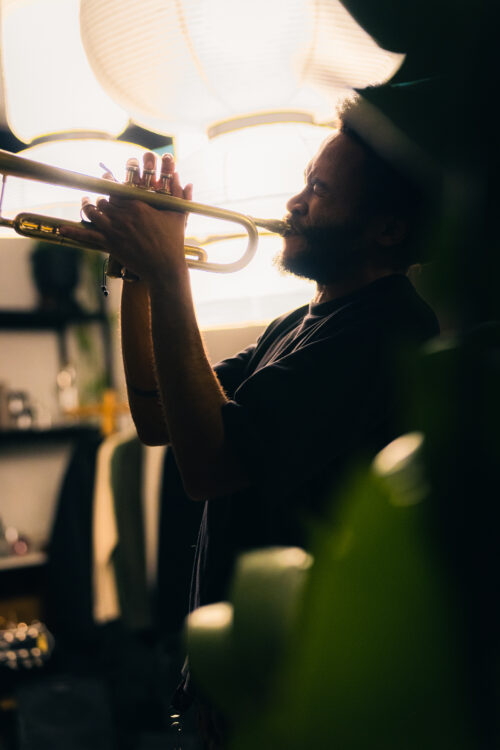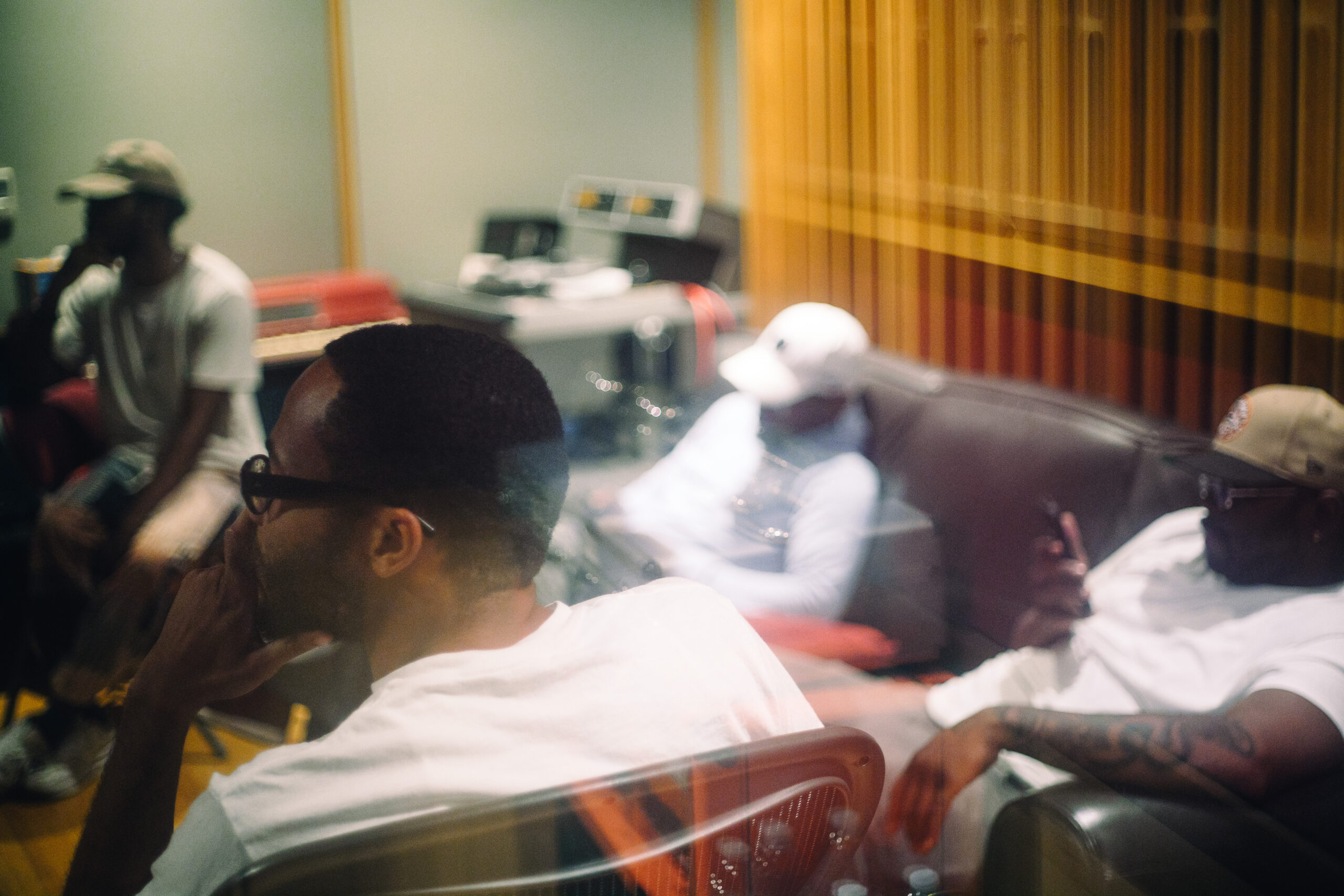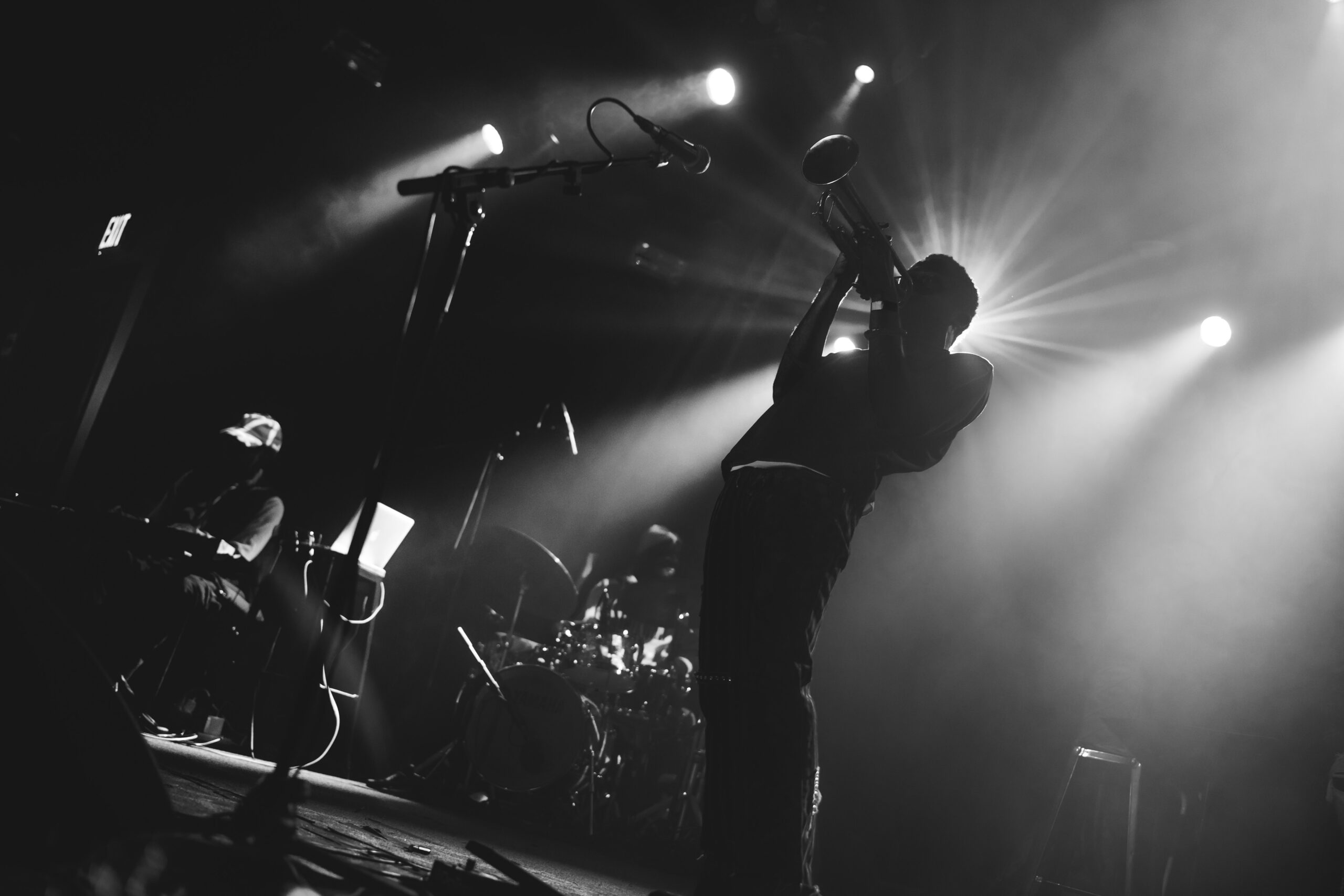To feel love is to be vulnerable and not have it held against you. This is one way that Brandon Woody’s philosophy of sound comes across.
From the first note, you are not only touched, you are held. The music becomes a way to release the thing holding you back, in order to be bound by something which is not at all interested in containing you. The sound is “made in the space of freedom,” which is how the Baltimore-based trumpeter, 26, characterizes his approach to composition. What is made in that space is also rooted in vulnerability, because it reflects a journey, one that is guided, but full of unknowns. This is a kind of pilgrimage he has taken to that interior space of reflection on all that we have been and done.
Though a life in music is an unending journey, Woody has decided to finally pause, to turn to us directly, and to show us how it sounds when we allow love to resolve all. Though his band, Upendo, has been a mainstay of the Baltimore and D.C. music scenes since 2018, Woody has yet to release an album. That will change in 2025, in a major way. This week, Blue Note Records announced that Woody and Upendo’s debut record will be released in the spring on that historic label.
It is a wise move for the imprint, and a career milestone for Woody. Speaking via Zoom last week, he reflected on the journey that has led up to this point. “I remember all of them summers I had with [trumpeter] Theljohn [Allen] just shedding at the crib, smoking blunts and playing duo trumpet,” he said. “All of them summers I had with [keyboardist] Troy [Long], locking in, composing together, practicing. All of the times that it’s rained [during a set], and my whole team had my back … like, ‘No, we still ready … we going through the rain.’”
It was a journey that has been both straightforward and filled with twists and turns, but one where the timing always seemed right.
Almost a century ago, when W.E.B. Du Bois looked back on the enslaved’s push toward their own emancipation and found that it could brook no “rational” explanation, he turned to their own understanding of the source of their determination: It was always in divine order. For the enslaved, “Freedom was God,” he would intone. It is the same with Woody. When words failed, he often resorted to what Black folk in the world have always resorted to in our common project of meaning-making. “When I tell you,” he said, “it was just God.”
To a social scientist, it might make little rational sense how a brother from Baltimore could rise above the circumstances of Black life in those environs and then decide to return and make a life with his trumpet. And yet to still believe that in order to make that sound that we must have, one needs not just the toughness or fieriness that has sustained Black resistance and survival, but the sincerity and belief that it is not about or up to us as individuals. It is our job to make our differences congeal into a composite practice that resonates across those differences.
We have to see the God in each other to make music, to make a band, and thus make a difference in the lives of those who are the hearers. It’s just God; a just God.

Upendo is a Swahili word for love, and closely approximates a communal act of solidarity — a notion that rarely appears in public expressions of love in the West. Most of us really do not know what upendo is. English translations cannot easily decide between the Greek conceptions of love, be they eros or agape or philia. It’s easy to get caught up in that conversation. But translation here becomes futile. Upendo really just means upendo. You will know it when you finally feel it. And when you hear it, you can see it. When you see it, you can hear it. This kind of love means that the stage, the shed, the road and even the industry will need to conform to a new way of doing things. This is love-making of a different sort.
That freshness is what Brandon Woody’s Upendo has been offering to the Baltimore-D.C. scene since the band’s inception. It is now the world’s turn to experience it.
On the band’s naming, Woody related: “It’s really not complex at all. I was just searching for different ways to say love in different languages.” But the mere invocation of an African language brings in more than just words. It is a relationship, a grammar that, not coincidentally, underpins the musical genealogies that Woody extends. An honest appreciation of Black music’s deep history means that these ideals, or upendo, will always manifest in the outcome.
“I do believe what I’m doing right now is the most honest thing I could be doing,” Woody said. “I wanted to give folks just, like, an honest representation of who we are. How we’re here. I wanted to give folks the why. This is the why. This is why the music is happening.” The point is to be honest with yourself. The point is to honor the legacies that created the place from which you compose, the places from which you improvise. And to do it all together.
In our conversation, Woody shared the circumstance of his family’s arrival to Baltimore. His grandmother decided to move her nine children after her partner, Brandon’s grandfather, was killed near a plantation in Richmond, Va. Though Woody would never meet him, that familial history gave him something. “I look at the one picture that I have from my grandfather a whole bunch, like at least once a month,” he said. “And I always just imagine, ‘What type of man was this?’ I’m sure that I have some attributes from him.” These are the blues, what Woody described as “a way of life.”
There is also something about a love song, an intimacy that produces affection through sound, that finds its way to Black popular music through artists like Frankie Beverly and Maze or Stevie Wonder. These were the first musical sounds Brandon Woody remembers hearing in his home. He first tried to mirror those sounds via their rhythm, with his chosen first instrument, the drum, a choice that of course reflects something ancient and rooted in the traditions of Black music. “I would always bang on pots and pans, trying to create some rhythm,” he remembered.
As central to his journey as those first sounds is the fact that Woody has been the beneficiary of a robust music education. Moving away from the drums by age 8, he chose a simple-looking instrument that would initially give him some trouble. For two weeks he struggled to make a sound come out of the trumpet at Baltimore’s Leith Walk Elementary School, but Woody emerged triumphant and by the end of the year had earned the right to take the school’s trumpet home to practice every day. Woody remembers practicing constantly from then on. “I was playing all the time,” he said. “Soon as I would get back home, I would practice. I remember coming into school early to practice, and I would stay after school to practice.”
His burgeoning talent was supported on the weekends by the Peabody Institute’s Tuned-In Program, where he would get intense instruction on the instrument’s fundamentals, and by the Eubie Blake National Jazz Institute and Cultural Center, where his childhood love of Black music blossomed under the tutelage of multi-instrumentalist Craig Alston, known for his work with Fertile Ground. There was a steady deepening at work. Of these earlier foundational moments, Woody recalled, “I felt like each year or each couple of years, each season of my childhood, got more serious,” he said.
Now in command of his scales and other basics, Woody moved through schools like Cross Country Elementary/Middle and Roland Park Elementary/Middle School, giving him first-hand knowledge of the vast differences in arts funding within the Baltimore public school system. The systemic devaluation of neighborhood schools meant that music programs suffered. Because of his training at Peabody and Eubie Blake, Woody was ahead of his class, but he found it hard to grow. After a violent incident one day at Cross Country, Woody’s mother Gwendolyn, a nurse, left work to bring him home from school. She told him, “Look, you’re never coming back here again.” So, they moved.

Though Roland Park offered him the benefit of daily lessons and rehearsals, which supplemented and complemented what he was receiving at Peabody and in the All-City Honors band, Woody’s evolution seemed to require more. An older brother and trombonist, Bobby, had auditioned and gotten into the Baltimore School for the Arts (BSA), where Brandon would soon follow. At the majority-Black arts school, Woody found his center. “I loved it. I loved it so much,” he remembered. It was at BSA that Woody would meet vibraphonist Warren Wolf and reconnect with Alston, each of whom was in charge of the school’s jazz program at different times. But he would experience some disappointment. When he first arrived, the jazz combo was dominated by upperclassmen. Younger musicians were excluded.
In one early indication of his knack for making space for himself and his friends, they improvised a way forward. Woody and his friend (and current Upendo pianist/keyboardist) Troy Long created their own band, called Just Us Jazz. They even got a few gigs in the area. But as Woody remembered, they did not quite understand all that went into composition. “I was just writing chords like poetry,” he said. “I wasn’t aware of harmony, rhythm, etc. … It just looked nice to my eyes.” Here again, it is in the outcome where that respect for tradition emanates. “Looking nice” to our eyes is an “aesthetic” posture, an artistic philosophy all its own.
Poetic knowledge is born in the silences of technical knowledge, to riff on the poet Aime Cesaire. Subconsciously, the poetry-like chords would speak life, would contribute to an approach to the sound that has come to typify Woody’s pen. All great poetry is about making simplicity perform the task of revealing an unknown horizon. That was of course mirrored in the cultural posture of the music that had so inspired him. Black music is a poetics. And what Woody and his friends wanted most was, he said, “to play Black music.”
Technique is important, though. Scanning YouTube sometime during his sophomore year – when he’d finally gotten the chance to participate in a newly formed big band at BSA – Woody discovered the Berklee Five Week, a program for rising musicians. He applied and was accepted, and spent part of that summer studying with Terri Lyne Carrington and Rick DiMuzio and meeting the future icons of his generation: Julius Rodriguez, Morgan Guerin, Papuna Sharikadze, and Jeffery Miller, among others. Returning from that experience, Woody recalled, “I might have been the worst one at Berklee, but when I tell you that shit rubbed off on me. And that’s the thing you need: to be around people that are better than you, that are above you.” It gave him intention, and it gave him vision. His study would intensify from there.
Importantly, as Woody grew over the final two years of high school, the music program at BSA grew as well, giving him the opportunity to play in multiple contexts and formations. Applying to the major conservatories, Woody chose the Brubeck Institute in Stockton, Calif., where he roomed with Chicagoan saxophonist Isaiah Collier and became a student of composer/improviser and trumpeter Ambrose Akinmusire.

With Akinmusire as a guide, Woody reintroduced himself to his instrument. “We restarted me playing the trumpet,” he said. “He’s like, ‘Man. Let’s actually just restart.’ Like, ‘Let’s go from Day 1.’ And I needed that so bad, because I was playing with so much pressure, in an unhealthy way, that if I continued to play that way I wouldn’t be playing in 20 years. It wouldn’t be possible.”
Having internalized Akinmusire’s intervention, and with a small book of original tunes — many of which remain in his repertoire today — Woody followed one of his other Brubeck instructors, vibraphonist Stefon Harris, to the Manhattan School of Music. There Woody gained access to the cultural capital of New York City, while learning from instructors such as Harris and trumpeter Cecil Bridgewater. He also played in a combo with master’s candidate and drummer Savannah Harris, pianist Matt Malanowski, trombonist Rocky Amer, bassist Hwansu Kang and saxophonist Rodney King. New York also became his introduction to a wider world of music, and allowed Woody the opportunity to gig with Gio Escobar’s Standing on the Corner. That connection in turn led to Woody going on the road with Solange.
But then there was a sudden turn, a reversal of the typical route pursued by musicians who make their way to the supposed cultural capital of New York. Woody came home. And though he did not suddenly stop playing with those artists that he’d met in New York and elsewhere, he decided in 2018 that Baltimore would be the place that shaped his sound. “It’s not easy to make it out of Baltimore,” Woody related. “Everybody from here has a little bit of edge on their shoulders, because it’s not easy, you know. People hold what they have to death. People hold what they have very strongly, because they don’t want to lose it. And it means everything.”
When he moved back home, Long still lived nearby. They returned to the shed. They composed. With Baltimore’s Mike Saunders on bass and Roy Hargrove alum Quincy Phillips (and sometimes D.C.’s Kweku Sumbry) on drums, a working group was formed. They began to gig seriously, earning a monthly residency at Baltimore’s An die Musik that year. It grew their audience and transformed their sound. The culture of Baltimore was refracted through the sound of their coming together, through what Woody believed was their “common thing.”
“I think that’s something with my music,” Woody said. “It’s rough on the edges. But it’s filled with heart. And this is a loving city, you know.” They wrote and gigged through what Woody described as low points. “I’ve had to go through valleys in my life. Troy has. Mike has. Quincy has. So that’s [the] essence. We wanna play this [experience], we wanna play it in that specific way.” It was out of a recognition of those valleys that Upendo was born.
The next two years became a whirlwind. From leading gigs at now-defunct D.C. venues Marvin and Sotto, to sharing the stage with Theljon Allen, Donvonte McCoy and Lafayette Gilchrist on a vibrant U Street scene that included Twins Jazz and JoJo, Woody became a mainstay in the District. In Baltimore, he would develop his chops both as a performer throughout the city and as a curator of shows gaining an insider view of the business side of jazz. He even cut an unreleased record, but that independent project was disrupted by the pandemic. As Upendo continued to gain a following in the area, Woody’s connections to the larger music world enabled him to bring artists, such as the late Casey Benjamin, to perform in his home space.

Meanwhile, Woody remained open to possibilities beyond the jazz world, and found himself presented with the opportunity to work as an actor and composer in the film world. He has appeared most recently as the real-life character Roy “Tanglefoot” McCoy in Apple TV’s Lady of the Lake. He has also been a frequent composer and model in fashion and lifestyle campaigns with major national and international brands like Calvin Klein, Saucony, Union Los Angeles, and Eames. All of this has given him opportunities to do more — in the course of this work he managed to license his music and got valuable time in the studio — and this too is a space for improvisation.
But make no mistake: the music remains the home. It remains Woody’s true love.
In recent years, there have been other turns. Sometime in late summer 2023, Woody decided to take Upendo back to the drawing board, and he tamped down on the gigging. “I had a mindset shift,” he remembered, describing the moment when he decided to move away from live performance. “I stopped playing so much shows all the time everywhere. And we started rehearsing, locking in more.”
A few months into this interregnum, with word of Woody and Upendo spreading out well beyond the DMV, Blue Note Records came calling. After careful consideration, Woody ultimately decided that this storied imprint would be the home for his debut.
The label’s interest in him, Woody is sure, stems from the fact that the music is simply honest. It is that honesty that we hear and that resonates. Because we also know what it is to work in and through all that we’ve been through. In and through that vulnerability. In and through the relationships forged in a place like Baltimore. In and through the sounds of a trumpeter whose grandfather became an ancestor as a consequence of anti-Black violence, whose grandmother then raised nine children in Baltimore, and whose mother cussed her neighbors out so her son could practice. In and through these blues. In and through this love.
The compositions on his debut album – pieces that anyone who’s followed Upendo in recent years will have heard in a variety of live contexts – reflect what has coalesced into a coherent and profound way of thinking about sound and tradition and even life. For Woody, it begins with a “simple, honest and beautiful melody,” he said. “If it’s a simple, honest and beautiful melody, the chords are going to come with it, you know?” After that, Woody said, comes a relation to the audience. “I don’t know always exactly what they’re connecting to. This is for their personal life. But I don’t have to know that to know it’s a connection.”
It is Woody’s vulnerability and openness to that unknown that makes Upendo upendo.








Join the Conversation →